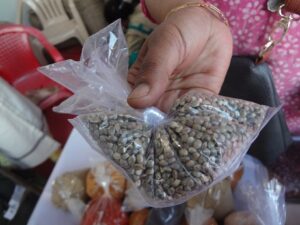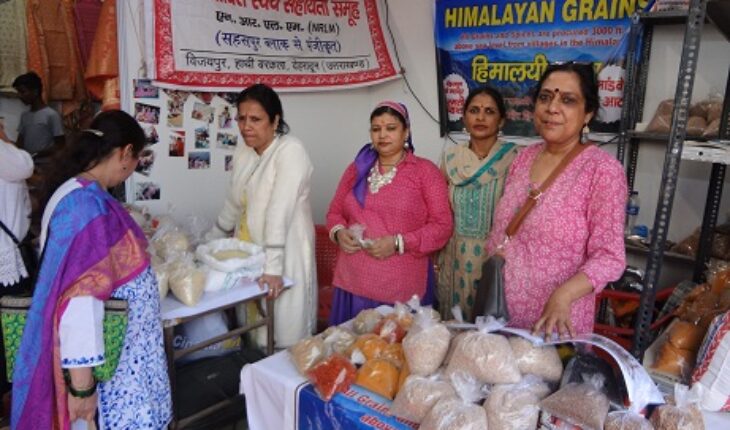The high and mighty Himalayan mountain ranges may present an icy, dominating appearance to the world, but the rural natives of nearby Uttarakhand appear to be unaffected by the snow and icy cold – or even threats of wildlife such as leopard attacks — as they go about their business of growing a variety of crops in the snowy mountainous region.
 One of these crops grown on this high altitude hilly terrain is: ‘Cannabis sativa’ (also commonly known as Hemp or ‘Bhang’ seeds) about which scientists are learning much on its beneficial effects to humankind. “No one knew how valuable a plant this is with therapeutic benefits to public health, economy. Studies show it helps in weight loss while assisting the body regulate insulin production and manage calorific intake more efficiently, “ says Poojadevi Dwivedi, a teacher-turned-social activist from Dehra Dun in Uttarakhand, who is assisting the self- help group that has come down to highlight its products and activities at a stall at the ongoing Mahalaxmi SARAS 2019 Fair in Mumbai.
One of these crops grown on this high altitude hilly terrain is: ‘Cannabis sativa’ (also commonly known as Hemp or ‘Bhang’ seeds) about which scientists are learning much on its beneficial effects to humankind. “No one knew how valuable a plant this is with therapeutic benefits to public health, economy. Studies show it helps in weight loss while assisting the body regulate insulin production and manage calorific intake more efficiently, “ says Poojadevi Dwivedi, a teacher-turned-social activist from Dehra Dun in Uttarakhand, who is assisting the self- help group that has come down to highlight its products and activities at a stall at the ongoing Mahalaxmi SARAS 2019 Fair in Mumbai.
How valuable people consider bhang can be seen from the fact that the entire stock of these seeds that were brought to Mumbai for sale were sold out – at barely Rs 50 for 50 grams –within a few days and we had come with only two kgs of it,” said Dwivedi, while adding “People consider it a protein and roast, grind and sprinkle it on salads to eat. Scientists and the government have released a good amount of evidence showing that ‘cannabinoids’ like this bhang fight certain types of cancer, help the body process and deals with food and obesity, while helping maintain and regulate the body’s metabolism.”
“The Uttarakhand Government is setting up a Plant for extracting ‘Hemp” seed oil for use in manufacturing soap as a quality yet expensive product. The Hemp shrub also used in making fabric,” said Dwivedi, who is also the president of another self-help group called Rajalaxmi SHG, that does catering for their Government function and activities and makes Rs one lakh per month that is divided among the SHG’s 10 members. “We get lots of snow, which is much-needed for growing Rajma beans as that particular soil needs it. The higher the altitude, the better the quality of Rajma which is sold at Rs 180-300 per kg. The white Rajma is popular because its not gassy but tasty and sold at Rs 260 per kg.”
Among other crops grown here are: White and Red Rajma (kidney) beans, Red Rice, Black and ‘Kulthi’ grams, Ragi seeds, Ashwagandha, Shaatavari (Asparagus Racemosus), Stinging Nettle, White Musli(Chlorophytum Borivilianum), among others. Beans provide folic acid, calcium carbohydrates, fibre and proteins, are good for diabetics by keeping sugar balanced and cleansing digective tract and lowering risk of colon cancer. Red Rice is good for diabetes, asthma and oxygen. Black gram (energy, anti-ageing, kidney stones); Ragi (calcium); Ashwagandha (cholesterol, cortisol, stress, immunity); Shataavari is asparagus (antioxidant, diabetes, immune system); Stinging nettle (arthritis, vitamins, liver); white musli (energy, aphrodisiac, obesity)
The self-help group also benefits it members in many ways including providing a lifeline for earning income amidst life problems. “One of the members was deserted by her husband and her son went missing at age of 18. Now she chooses to work with widows and other women with +broken wings+ through this SHG, that also provides a profitable working solution from their problems,” said Dwivedi who is working towards women’s empowerment and employment.
Seema Sharma of the Sarva Shakti SwayaSahayta Samuha (NRLM) in Uttarakhand is President of the self-help group that includes widows and others, who fend for themselves successfully with growing and selling the Himalayan grains amidst threats from wildlife like leopards, that have been prowling around and even picked up two of their dogs, besides causing human deaths. Other threats that they face are from the black sloth bear and monkeys – who steal the planted potatoes – living in the forests that comprise 70 per cent of total Uttarakhand area while also providing oxygen as a ‘green lung’ for the state.
The leopard attacks occur mostly on women and children – who are the majority workers in the fields – where even the ‘Scarecrow’ is made as a woman with ‘odni’ to drive away seed-picking birds, she said while proudly declaring the musk deer as their state animal and the Monal their state bird, and mentioning that the local “BRAUNS” tree provides juice that even “opens blocked veins of the heart.”
Hailing from Village Nayagaon near Dehra Dun, she said majority of the grains brought here have been evoking interest and sales from the people curious to know about life in amidst the icy, snowy mountain regions. The SHG members had come with 17-18 types of consumable items in 32 bags weighing 50 kgs each, which was reduced to barely 4.5 bags – thanks to excellent buyer response at the Fair, she said.






